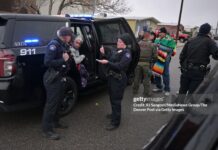News Americas, NEW YORK, NY, Fri. Jan. 11, 2019: Today, Friday, January 11th, the Permanent Council of the Organization of American States will hold a special meeting at OAS headquarters in Washington, D.C. at the request of Secretary General Luis Almagro to consider the “Situation in Nicaragua.”
The 15 countries that make up the Caribbean Community (CARICOM) have an important weight if there is a vote to apply the Inter-American Democratic Charter clause 10, which allows it to “sanction member states that suffer institutional, repeated and extended breaks in the Inter-American Democratic Charter.”
Activists hope this will be today to check the Daniel Ortega regime and support the people of Nicaragua. Especially since Nicaragua represents the most recent in a long list of countries whose authoritarian governments have contested the fundamental principles of freedom of expression and the right to protest.
President Daniel Ortega’s government has cancelled the legal status of civil society organizations, suppressed community media outlets and perpetrated attacks on journalists and demonstrators since April 2018 and intensified these rights violations in recent months.
The April 18, 2018 protests at the national level began against reforms to national security, imposed without consensus and affecting retired people, removing even more money from their pensions.
The protests were, however, answered with coordinated repression between national police and mobs, which used tear gas and rubber bullets in the beginning. But throughout the days after, the government forces began to use weapons of war, adding 109 murders in the first 42 days of protests. At the same time, looting was coordinated against private companies that supported the protests.
The self-assembled (auto-convocados) people, organized barricades and blockades at the national level to defend lives and businesses, and organized marches and protests to demand justice for the murdered and democratic reforms to change a government that had lost legitimacy.
On May 30, 2018, Mothers’ Day in Nicaragua, a march was organized in honor of the mothers of the murdered. The government reportedly attacked this march with snipers, leaving dozens injured and at least 18 murdered.
The students, one of the groups hardest hit by the repression, occupied several public universities to ask for reforms in university autonomy. However, each night they were attacked by mobs using firearms.
On July 13, 2018, an attack on the National Autonomous University of Nicaragua by para-police persecuted nearly 150 young people and students until they were locked in a church. Still they were kept under siege and under attack for 16 hours, despite the presence of media, the general population and the Catholic Church.
Another of the most affected groups was the campesinos, who set up blockades in the interior of the country. They were also reportedly repressed with lethal violence, including the massacre of San Pedro de Lovago, where peasants who had already agreed to leave were ambushed, persecuted and killed in the mountains. There is claim that at least 18 peasants were killed but many more have disappeared.
The continuous repression against the cities continued, especially in Masaya, where there was evidence of war weapons such as sniper rifles, rocket launches and machine guns.
Not satisfied with the repression through firearms, the State of Nicaragua is accused of coordinating actions through National Assembly, Judicial Power and National Police to persecute, detain and criminalize any person who has protested.
To date, there have been a reported 325 murders during the protests according to the IACHR, including 24 minors while there are more than 50,000 refugees and job losses are up to half a million.
However, the government has not yielded an inch in its position of power. The police, some activists claim, kidnap people and raid homes every day, without a warrant and close civil organizations without due process.
More than 500 political prisoners are reportedly being kept in jail for thinking differently or simply for being in the wrong place, like Brandon and Glen, two young men of Afro-Caribbean heritage, who were tried far from their place of residence without evidence for the murder of a journalist before judges who did not speak their language.
Media outlets have been invaded and closed while one journalist has been murdered. The closure of one TV channel, the de facto confiscation of the raw material of newspapers is now common place and more than 50 journalists have been forced to go into exile.
The State has also reportedly invaded more than 8,000 hectares of private property and 5,000 have not yet been returned.
The government agreed to participate in a dialogue process starting on May 16, 2018. But at the same time that it participated in this dialogue, it continued with a repression plan, activist say, breaking all value in its own words.
One month after beginning of the dialogue, Nicaragua woke up to the news of a living family burned, including two babies, because they refused to lend their house to a sniper station to be used against university students.
An independent investigation found that this level of coordination between the Police, the General Assembly, Justice and all the ministries of the State could only have been directed and allowed by the highest levels of government, led activists say, by Daniel Ortega and Rosario Murillo, who some claim should be investigated for crimes against humanity.
More evidence of this coordinated strategy of death can be seen in United Nations and Amnesty International reports.
But in Nicaragua, the resistance continues every day, in spite of the persecution and espionage. The crisis is, however, also affecting Central America and the consequences, activists say, can only grow if the repression in Nicaragua does not stop and there is a limit to the authoritarian and criminal governments.
In Costa Rica alone, 50,000 refugees have arrived from Nicaragua, not counting those who have arrived in the United States, Mexico, the rest of Central America, and Europe.
A depressed economy in Nicaragua, which needs a political solution, is aiming to weaken the economy of the entire Central American region. Nicaragua imported more than $365 million dollars from the rest of Central America in the first quarter of 2018, and without a solution in Nicaragua this demand will only decreas
“What is happening in my country Nicaragua is very unacceptable,” Rene Arroliga said by email. “The Daniel Ortega regime is killing students, closing news outlets, throwing in jail reporters and anyone against his government. NGOs have been expelled from the country and hundreds have been killed since April 18, 2018 while hundreds more have been thrown in jail.
“The countries of the Americas must vote against this evil government. Ortega will claim that there was an attempt to coup d’état. All OAS ambassadors must vote against Ortega’s government on January 11th.”











